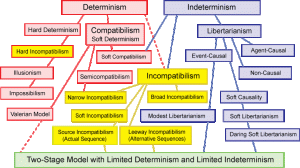Is Dark Matter a Glimpse of a Deeper Level of Reality?
Is Dark Matter a Glimpse of a Deeper Level of Reality?
Something that’s been going through my mind lately, for around 4 or 5 months, with all the talk by determinists, is that it is premature to start saying we know everything about physics. It just strikes me that this is similar to about 120 years ago when some held the view that physics was complete, and all that was left to do were ever finer measuring of everything discovered.
This article at Scientific American explains recent attempts to theorize matters of space and time in ways that are outside the bounds of our minds to truly understand, such as time being an emergent property of a deeper reality, and even more bizarre things.
An example is made of dark matter, which does not seem t abide by the known properties of matter, and mention is made of MOND and other incomplete, but situationaly explanatory, hypothesis and theories like Superstring.
It starts out by revisiting a 2 year old paper that was initially viewed with great scepticism, but has seen a resurgence of discussion lately:
Two years ago several of my Sci Am colleagues and I had an intense email exchange over a period of weeks, trying to figure out what to make of a new paper by string theorist Erik Verlinde. I don’t think I’ve ever been so flummoxed by physicists’ reactions to a paper. Mathematically it could hardly have been simpler—the level of middle-school algebra for the most part. Logically and physically, it was a head-hurter. I couldn’t decide whether it was profound or trite. The theorists we consulted said they couldn’t follow it, which we took as a polite way of saying that their colleague had gone off the deep end. Some physics bloggers came out and called Verlinde a crackpot.
There is the matter(lol) of dark matter and energy, and now speculation about what black holes really are:
In that case, black holes represent a new phase of matter. Outside the hole, the universe’s “degrees of freedom”—all that its most fundamental building blocks are capable of—are in a low-energy state, forming what you might think of as a crystal, with a fixed, regular arrangement we perceive as the spacetime continuum. But inside the hole, conditions become so extreme that the continuum breaks apart. “You can make spacetime melt,” Verlinde told me. “This is really where spacetime ends. To understand what goes on, you need to use these underlying degrees of freedom.” Those degrees of freedom cannot be thought of as existing in one place or another. They transcend space. Their true venue is a ginormous abstract realm of possibilities—in the jargon, a “phase space” commensurate with their almost unimaginably rich repertoire of behaviors.
As I have recently read, the question of Quantum effects being relevant in our brains with the knowledge, now, of a deep structure of nanotubes that may have functional components in the overall operation of neurons that we haven’t considered before, there is very much unknown regarding how the brain functions. There is Gödel’s proof that no purely deterministic system, such as a computer, can have consciousness. There is the inability to explain what ideas and our sensory perceptions really are by any stretch of ‘known’ physics, that determinist’s insist is irrelevant (even Gödel concludes this, though), with which I have serious reservations about right from the get go.
Much to boggle the mind these days, in any event!



Posted January Posted January 1, 2012 at 12:57 pm | Permalink